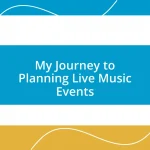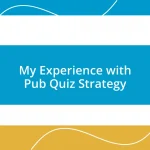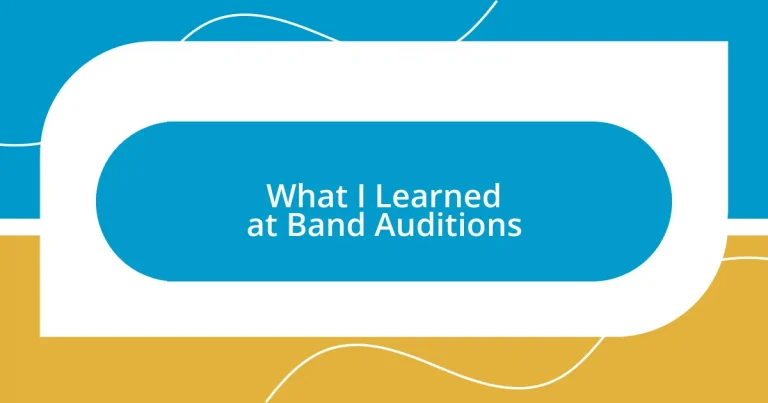Key takeaways:
- Structured practice and visualization are essential for building confidence and reducing nerves before auditions.
- Effective communication with judges and embracing feedback can enhance performance and lead to personal growth.
- Post-audition reflection and sharing experiences with fellow musicians can provide valuable insights for improvement and create a supportive community.
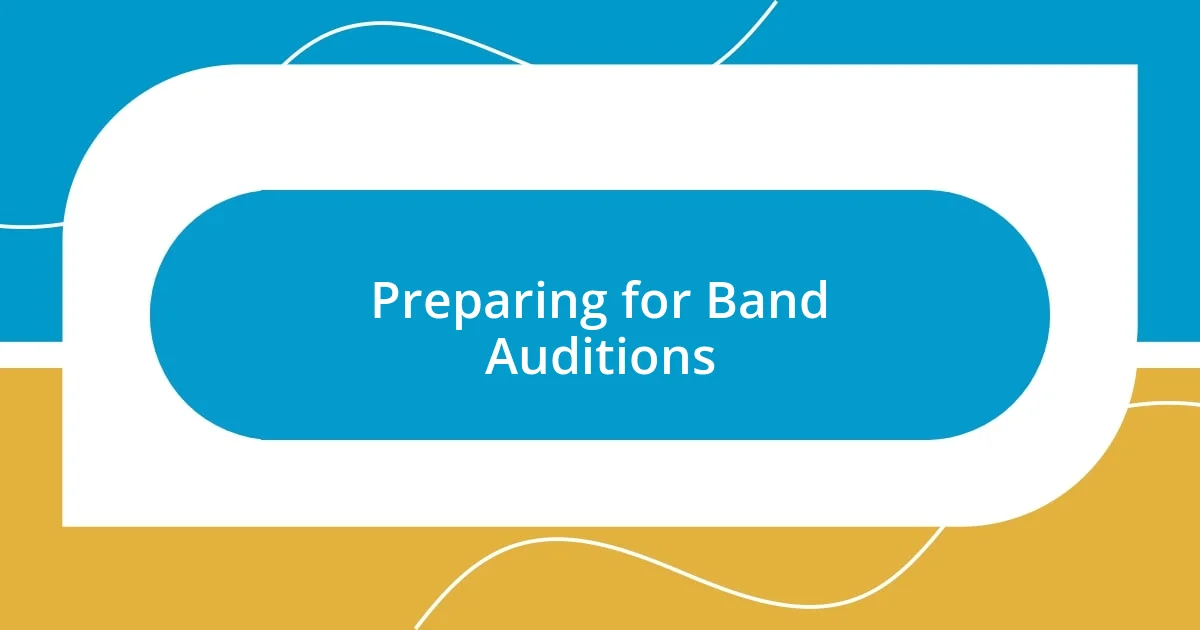
Preparing for Band Auditions
Preparing for band auditions can be both exciting and nerve-wracking. I remember the first time I stepped onto the stage, heart racing, palms sweaty. It struck me then how vital it was to really know the piece I was about to perform. What if I had practiced a bit more? That thought drove me to create a structured practice plan leading up to the audition.
Creating a practice schedule tailored to my strengths and weaknesses was a game changer. I found time to work on challenging sections, and I even recorded myself to listen for mistakes I might overlook during live practice. This reflection helped me to feel more prepared and confident. Have you ever spent time just listening to your own playing? It truly opens your ears to areas needing improvement.
Visualizing the audition was another crucial part of my preparation. I would close my eyes and picture myself walking into the audition room, taking a deep breath, and nailing the performance. This positive mental imagery helped calm my nerves. It made me wonder: how do you picture your success? Embracing this mindset made all the difference for me when the moment finally arrived.
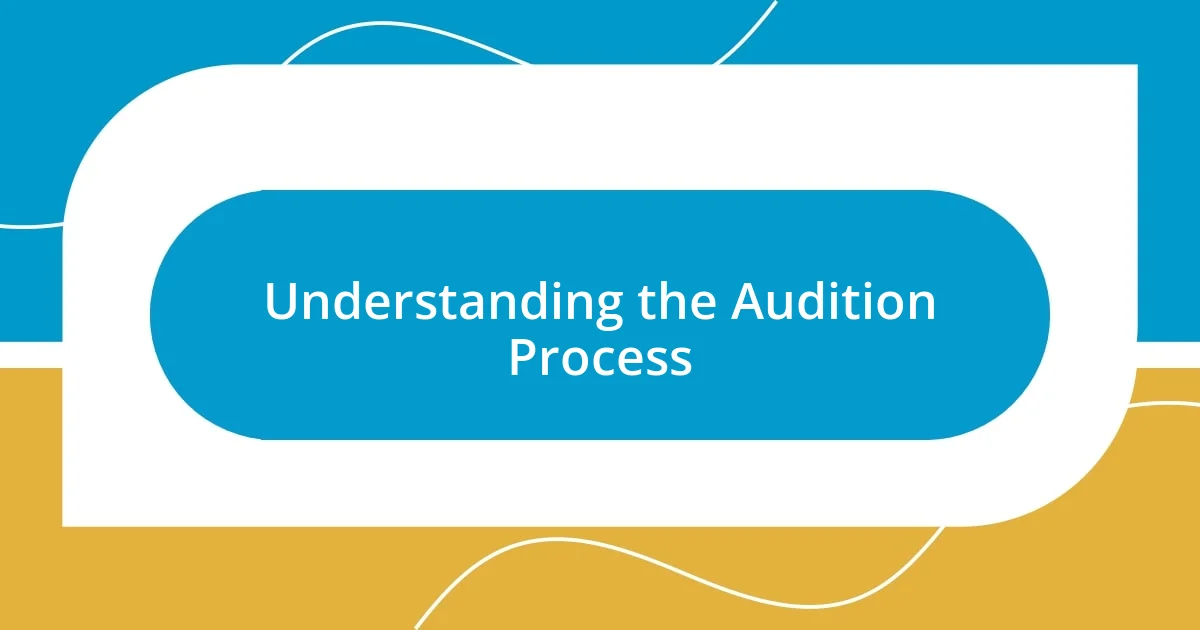
Understanding the Audition Process
Understanding the audition process is essential for anyone stepping onto that stage. I learned that it’s not just about the music; it’s also about understanding the environment. The first time I walked into an audition room, I was struck by how different it felt from my practice space at home. It was quieter, more focused, and had this palpable air of expectation. Knowing that everyone else was undergoing the same experience helped me realize that nerves are completely normal.
Communication can be just as important as the performance itself. I always thought auditions were purely about showcasing talent, but the way you interact with the judges really matters. In one audition, I made eye contact and smiled at the panel before starting, which eased a bit of my anxiety. This small connection made me feel more human and less like a robot performing notes. It’s a reminder that they’re not just looking for perfection; they want someone who can connect with the music.
Another crucial aspect of the process is accepting feedback, whether it’s during a mock audition or in the actual performance. After one audition, I received constructive criticism that stung, but I took it to heart. Rather than feeling defeated, I used it as fuel for growth. Have you ever had your heart set on a particular performance, only to get advice that completely changed your approach? That openness to critique has only made me a better musician.
| Aspect of Audition | My Experience |
|---|---|
| Environment | Felt starkly different than practice; created a sense of expectation. |
| Communication | Making eye contact with judges helped ease nerves. |
| Feedback | Accepting critique led to significant growth. |
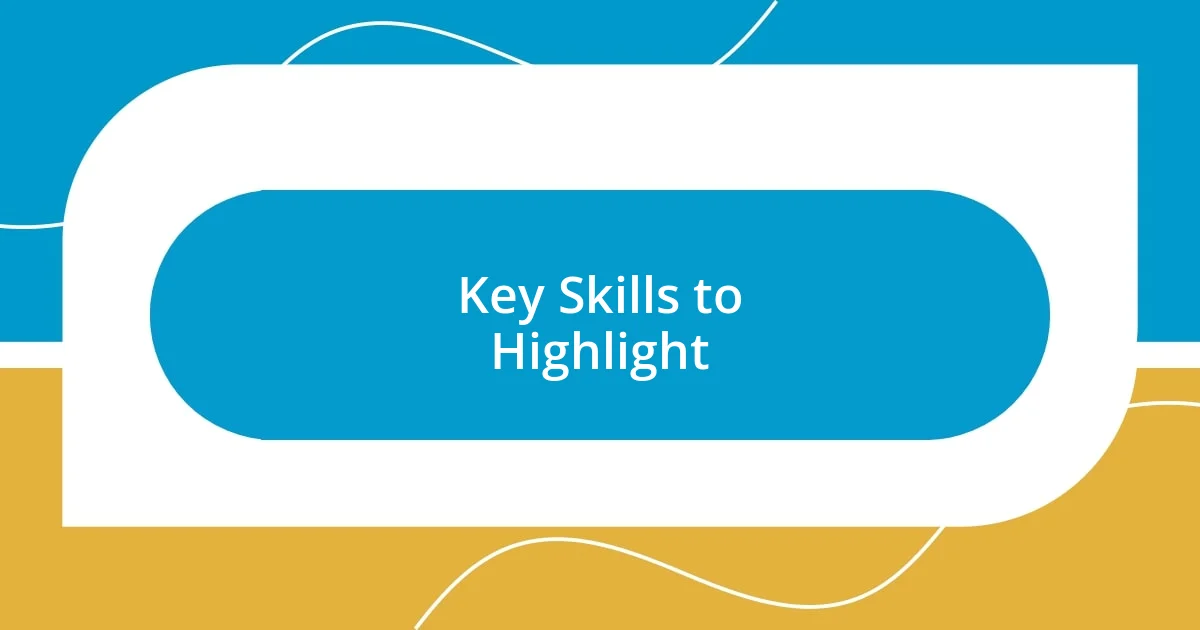
Key Skills to Highlight
When it comes to auditions, highlighting key skills can truly set you apart from the rest. One of the most vital skills I learned to emphasize was adaptability. I recall sitting in one audition, unexpectedly given a different piece to perform. Instead of freezing, I took a deep breath and quickly assessed my music theory knowledge to make it work. Flexibility not only showcases your musicianship; it also conveys your composure under pressure, which any panel appreciates.
Here are some essential skills to mention:
- Adaptability: Your ability to handle unexpected changes with ease.
- Musicality: Demonstrating expression in your performance that connects with the audience.
- Technical Proficiency: Mastering your instrument to play with precision.
- Stage Presence: Engaging the audience and making them feel part of the experience.
- Collaboration: Showing your willingness to work with others, especially in ensemble auditions.
Another skill worth noting is self-awareness, which often goes hand in hand with accepting feedback. Before one of my auditions, I was overly critical of my own sound. Just as I was about to walk on stage, I realized I needed to shift my focus to the music and what my unique sound could bring to the band. This shift made me feel more grounded and enabled me to perform authentically. Self-awareness can enhance not only your performance but also your interactions with judges, making you more relatable and sincere.
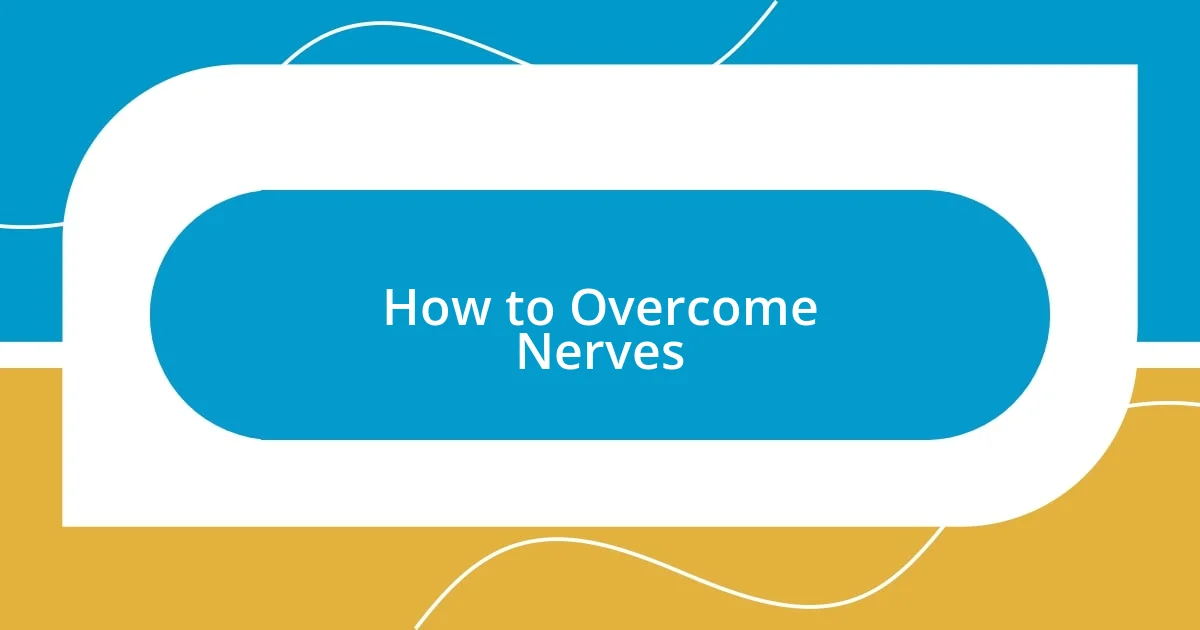
How to Overcome Nerves
When it comes to overcoming nerves, one technique that helped me tremendously was visualization. Before stepping onto the stage, I would close my eyes and picture myself confidently performing, connecting with the music, and engaging the audience. This practice made the audition feel more familiar and less intimidating, almost like a rehearsal in my mind. Have you ever tried this? The power of imagination can be a game changer.
Another effective strategy is to focus on your breath. In moments of anxiety, I found that taking deep, deliberate breaths calmed my racing heart and centered my thoughts. It’s incredible how something so simple can root you back to the present. When I’m feeling jittery, I remind myself that I can control my breathing, even when I can’t control the outcome of the audition. This awareness gave me a sense of power amidst the uncertainty.
Lastly, I learned the importance of acceptance. Embracing the nerves as part of the experience rather than fighting against them made a significant difference for me. I remember gearing up for one particularly challenging audition, where I could feel my heart pounding. Instead of brushing those feelings aside, I accepted them as a sign that I cared about my performance. This shift in perspective helped me channel that energy into my playing, making it a catalyst for passion rather than a source of trepidation. What if those butterflies in your stomach could actually fuel your performance?
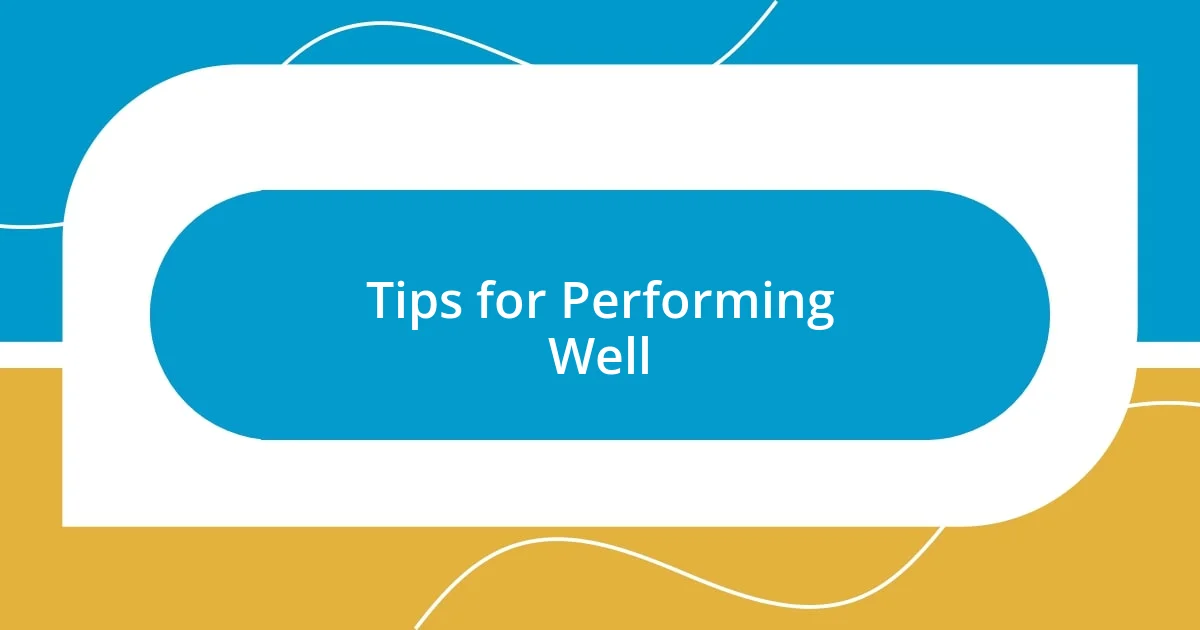
Tips for Performing Well
When it comes to performing well, one piece of advice I can’t stress enough is the power of preparation. I remember one audition where I felt incredibly confident because I had not only practiced my pieces but had also prepared thoroughly for potential questions about my choices. This level of preparedness transformed my anxiety into excitement; I was eager to share what I had worked so hard on. Doesn’t it feel great to walk into an audition ready to showcase your talent?
Another tip that resonated with me is the importance of connection—both with the music and the audience. During a recent audition, I chose a piece that was deeply meaningful to me. As I played, I imagined sharing that story with each listener. This connection elevated my performance beyond mere notes on a page; it became a heartfelt experience. Have you ever noticed how when you’re genuinely invested in your music, the audience feels it too?
Lastly, I found that self-compassion can make a world of difference in performance. Right before one particularly nerve-wracking audition, I caught myself critiquing every mistake from past performances. In that moment, I stopped and reminded myself that everyone has off days. Accepting my imperfections allowed me to relax and focus on doing my best without the weight of perfectionism holding me back. What if we all treated ourselves with that kindness?
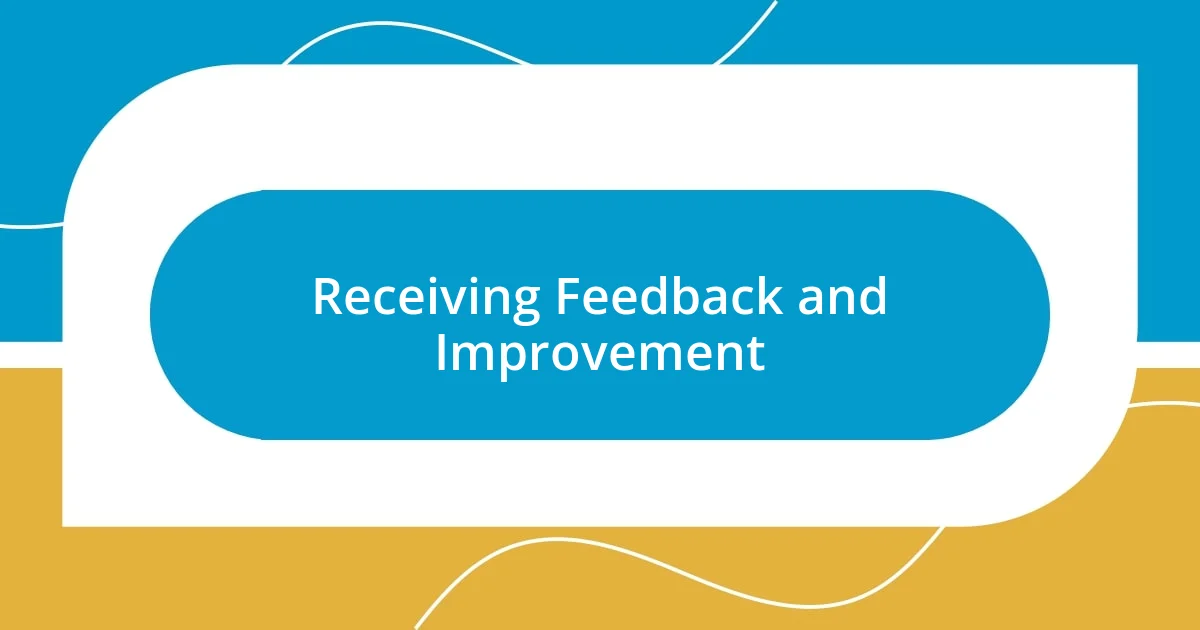
Receiving Feedback and Improvement
Receiving feedback can be one of the most enlightening parts of the audition experience. I vividly remember one time when a judge pointed out a subtle timing issue in my piece. Initially, my instinct was to feel defensive, but then I took a moment to process the feedback. I realized that this insight was an opportunity for growth, not a personal attack. Have you ever felt that initial sting of criticism turn into a valuable lesson?
Improvement often stems from the willingness to embrace constructive criticism. After an audition where I stumbled during a challenging passage, I sought out advice from a trusted mentor. Their perspective helped me see that every artist has areas to work on and that it’s okay not to be perfect. I started incorporating their recommendations into my practice routine, which not only enhanced my skills but also transformed my mindset. How often do we let our fears of inadequacy stop us from evolving?
Sometimes, it takes time to fully digest feedback and truly implement changes. I recall a moment post-audition when I spent hours ruminating over the comments I received, understanding that this was part of the process. The key was patience; I needed to allow myself to absorb the criticism instead of rushing to fix everything immediately. In my journey, I found that reflection can lead to deeper learning and stronger performance. How do you approach feedback in your practice?
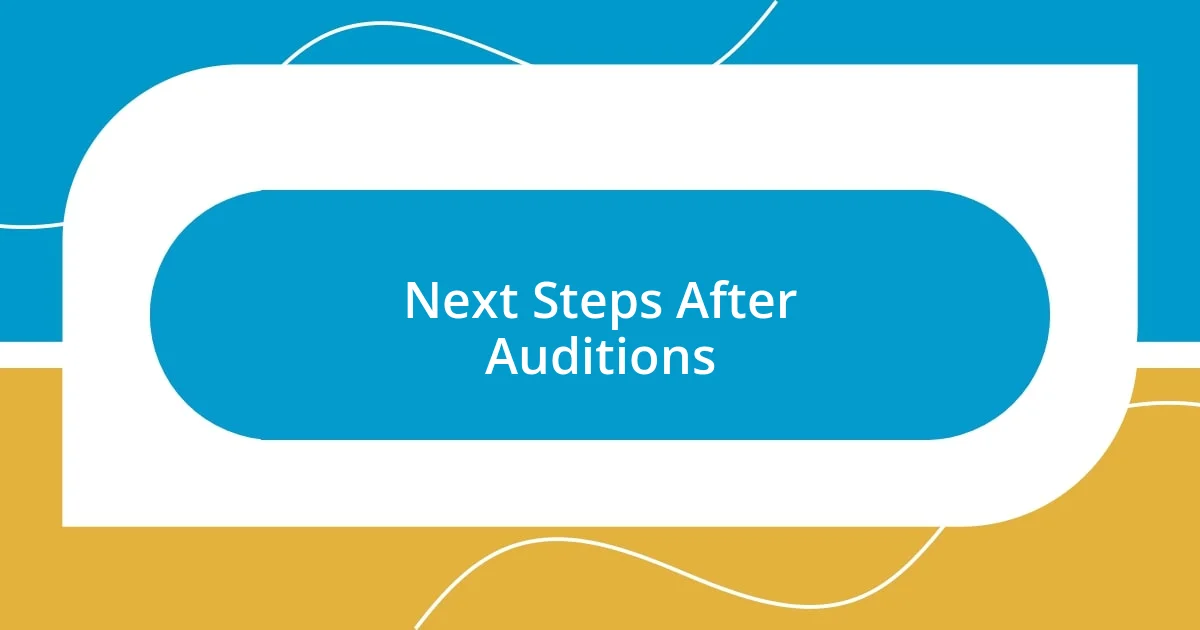
Next Steps After Auditions
After auditions, taking proactive steps toward improvement is crucial. I always make it a point to jot down my immediate thoughts and feelings after stepping out of the audition room. This practice helps me process the experience while it’s still fresh in my mind. Have you ever tried capturing those raw emotions? It can reveal insights that might get lost over time.
Another key step for me has been reviewing any recordings of my performance. I vividly remember one audition where I felt great. However, when I watched the video back, I noticed some subtle nuances I hadn’t been aware of, like my breathing patterns and the way I held my instrument. It felt a bit uncomfortable acknowledging those aspects, but it opened up avenues for improvement that I hadn’t considered before. Isn’t it fascinating how our perception can differ from reality?
Lastly, I find it invaluable to share my experiences with fellow musicians. After one audition, I gathered a small group of friends who had also auditioned. We swapped stories and feedback, and it was refreshing to realize that we all faced similar challenges and triumphs. This camaraderie not only built our confidence but also fostered a supportive environment where we could all grow. Have you reached out to others in your musical journey? You might be surprised at the wisdom waiting to be shared.

